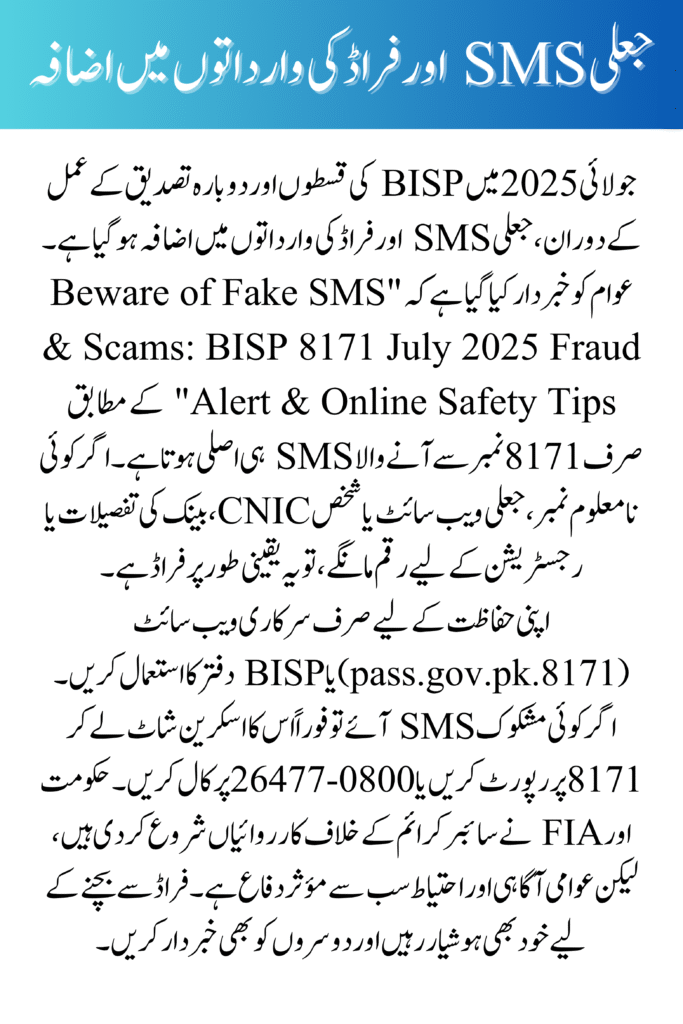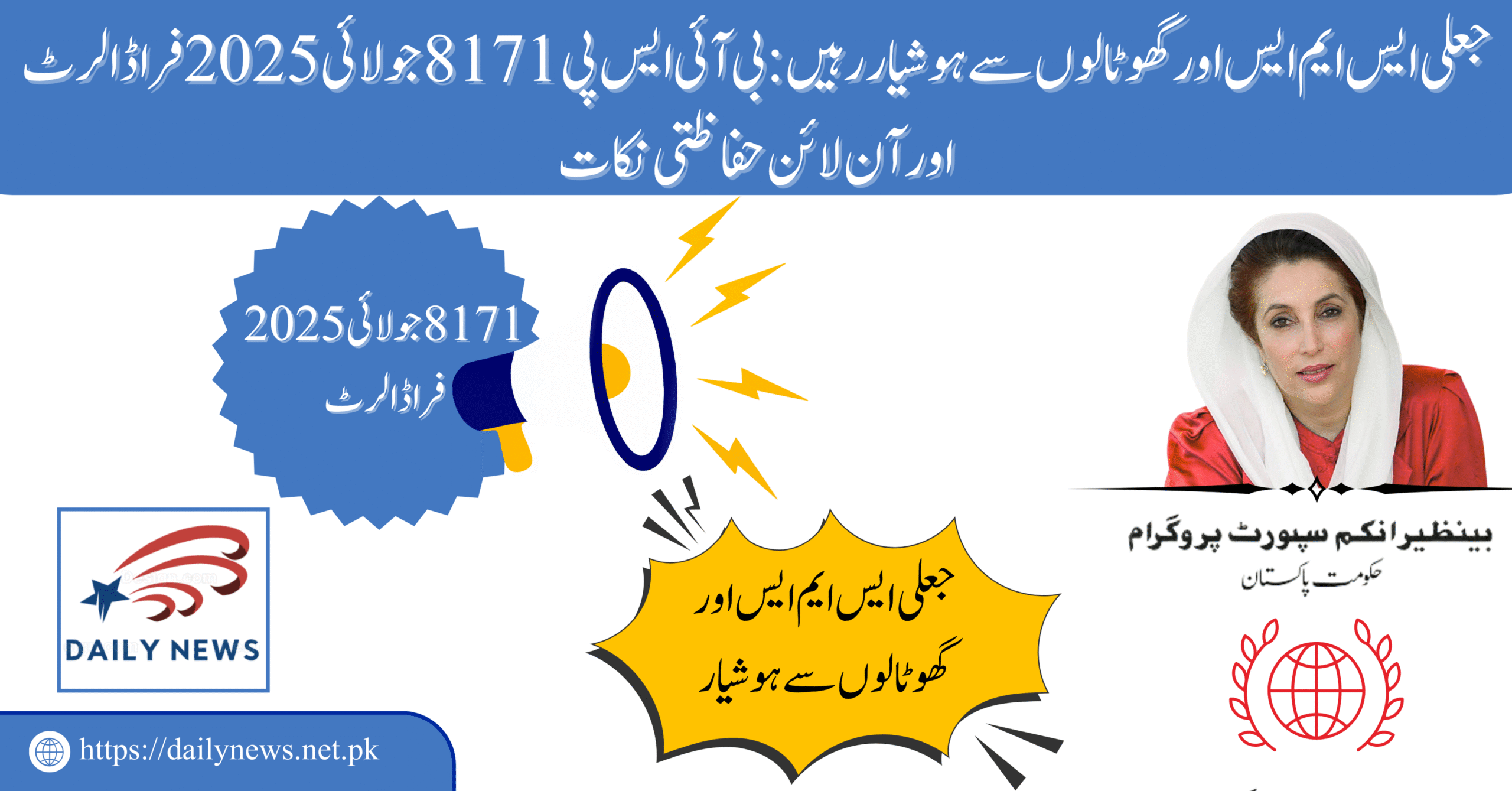In July 2025, as thousands of Pakistani citizens await financial assistance through the Benazir Income Support Programme (BISP), a new challenge has emerged—scam messages and fraud attempts. If you’re receiving suspicious texts claiming to be from BISP or 8171, it’s time to beware of fake SMS & scams: BISP 8171 July 2025 fraud alert & online safety tips are more important than ever. This article explains how to identify fraud, protect your personal information, and avoid becoming a victim during this critical period of payments and registration.
Why BISP 8171 Is Targeted by Scammers
The Benazir Income Support Programme (BISP) is one of the largest government welfare initiatives in Pakistan. It provides quarterly cash payments to low-income women and families through CNIC-based verification.
As the 8171 SMS verification system is the primary way to notify beneficiaries, scammers are exploiting this channel. Fake messages, calls, and even fraudulent websites are being used to steal personal information, CNIC numbers, or even bank details under the guise of providing financial support.
What Does a Fake BISP SMS Look Like?
Scammers have become more sophisticated in mimicking official communication. A fake BISP SMS may look like this:
🔴 “Apka BISP 8171 payment tay ho chuka hai. Rs. 12,000 jari kar diye gaye hain. Tafseelat ke liye is number par rabta karein: 0300-XXXXXXX”
🔴 “Ap ka naam BISP program mein shaamil hai. Apni tafseelat foran bhejein. Link: fakeportal123.com”
These messages may appear urgent and legitimate, but they are not from the official 8171 service.
Visit Us: 8171 July 2025 Fraud Alert
Official Communication Channels of BISP

It’s essential to recognize how real BISP communication works:
✅ SMS will only come from 8171 — no other number is used for official messages.
✅ No one from BISP will ask you to send personal documents over WhatsApp or third-party apps.
✅ The only official BISP websites are:
Signs You’re Dealing with a Scam
To protect yourself, be aware of these red flags:
🔸 Unknown Phone Numbers – If a message comes from any number other than 8171, it’s a scam.
🔸 Suspicious Links – Never click on short URLs or unverified website links.
🔸 Request for Payment – BISP services are free. If someone demands money for verification or registration, it’s a scam.
🔸 Urgency or Threats – Messages that say “your payment will be canceled if you don’t respond” are designed to pressure you into acting quickly without thinking.
🔸 Asking for CNIC or Bank Details via Call – Official representatives never ask for such data on phone calls.
How to Respond to a Fake Message
If you suspect a scam, follow these steps:
🔐 Step 1: Do Not Respond
Ignore any request for information or callbacks.
📸 Step 2: Take a Screenshot
Capture the message or caller ID for your records.
🚨 Step 3: Report the Scam
Send details of the scam to the official BISP helpline:
- Call: 0800-26477
- Email: [email protected]
- SMS: If you receive a scam SMS, forward it to 8171 along with your CNIC and write “Scam Alert.”
July 2025 Fraud Alert: What’s Happening Right Now
As July 2025 marks the latest round of BISP payments and re-verification, scammers are taking advantage of increased public activity. According to recent reports:
- Fake agents are visiting homes, offering quick payments for a “fee.”
- Some women are receiving calls claiming their payments are blocked unless they share CNIC numbers.
- Fake websites are circulating on social media, pretending to be BISP portals.
These fraudulent tactics are increasing, especially in rural areas. That’s why the government and cybersecurity units have issued a July 2025 fraud alert, urging citizens to stay alert and cautious.
How to Safely Check BISP 8171 Eligibility or Payment
Always use official and verified methods to check your BISP status:
✅ Via SMS
- Open your message app
- Type your 13-digit CNIC number
- Send to 8171
- Wait for the official response from the 8171 number only
✅ Via 8171 Web Portal
- Visit: 8171.pass.gov.pk
- Enter your CNIC number and the code shown
- Click “Submit”
- Your eligibility and payment details will appear on screen
Tips to Stay Safe from BISP Scams
Here are practical tips to protect yourself and your family from 8171-related scams:
🔒 Never Share Personal Details on Calls
Whether it’s your CNIC number, mobile number, or bank details—only use secure official portals.
🧾 Avoid Third-Party Registrations
Do not give your ID card to shopkeepers or agents claiming to register you. Go directly to a BISP Tehsil Office or designated Registration Center.
📵 Block Suspicious Numbers
Use your mobile phone settings to block any number that sends you scam messages repeatedly.
📢 Inform Your Community
Educate your neighbors, especially elderly women, about these scams. Awareness is the best defense.
Role of Government in Tackling BISP Scams
The Government of Pakistan is taking strong action to combat fraud. In July 2025, the following measures have been introduced:
- Cybercrime Wing of FIA is actively tracking and arresting scammers
- BISP Help Desks are being set up in more areas to assist with verification and complaints
- Public Awareness Campaigns are being aired on TV, radio, and social media
Still, public cooperation is key. By reporting fraud, you can help stop others from becoming victims.
Frequently Asked Questions (FAQs)
What if I already shared my CNIC with a fake number?
Immediately report to BISP and NADRA. Also, check if your CNIC has been misused by sending it to 8171 or visiting a BISP office.
How can I confirm that a message is really from BISP?
It will only come from 8171. Any other number is fake.
Can I check my BISP status using WhatsApp?
No. There is no official WhatsApp service for BISP eligibility or payment.
Are there agents who can speed up the BISP payment process?
No. Anyone who claims to speed up or “unlock” your payment in exchange for money is committing fraud.
Conclusion: Stay Alert, Stay Safe
As the BISP 8171 July 2025 fraud alert shows, scammers are targeting the most vulnerable—those who need this financial aid the most. By staying informed, using only official BISP channels, and reporting any suspicious activity, you can keep yourself and your community safe.
Beware of fake SMS & scams: BISP 8171 July 2025 fraud alert & online safety tips are not just for information—they’re for your protection. Always double-check, report fraud, and spread awareness. No payment or message is worth risking your identity.
